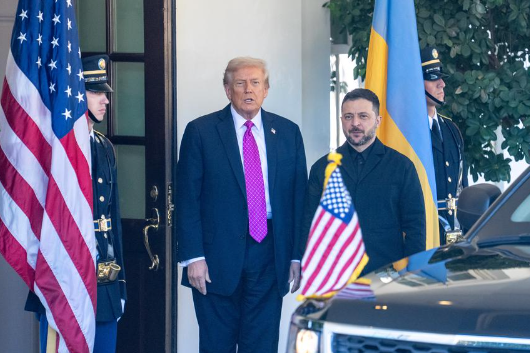Is the new Ukraine "peace plan" a real deal for peace?

U.S. President Donald Trump (2nd L) welcomes Ukrainian President Volodymyr Zelensky at the White House in Washington, D.C., the United States, Oct 17, 2025. (Xinhua/Hu Yousong)
The main sticking point is likely to remain territory, a key issue left unresolved in the revised plan.
The U.S.-proposed 28-point "peace plan" was unveiled last week. Following its release, representatives from the United States, Ukraine and several European countries met in Geneva on Sunday to discuss the plan.
Through discussions, the revised plan has been cut down to 19 points but not been made public, marking the latest shift in the ongoing diplomatic push to end the four-year-old war.
How close, then, does the revised plan come to real peace?
DIPLOMACY EFFORTS AS WAR RAGES
In the hope of finalizing the draft plan, U.S. President Donald Trump said Tuesday he has directed his special envoy Steve Witkoff to meet with Russian President Vladimir Putin in Moscow, while Army Secretary Daniel Driscoll is expected to meet Ukrainian officials in the coming days.
The Kremlin confirmed on Wednesday that "a preliminary agreement has been reached."
Citing an unnamed source, Axios reported on Tuesday that a Ukrainian delegation led by Ukrainian Defense Intelligence chief Kyrylo Budanov has been holding talks with both the Russian and the U.S. sides in Abu Dhabi, capital of the United Arab Emirates.
However, as diplomatic efforts to end the war continued, strikes still spread. Ukraine on Wednesday reported another night of Russian air strikes, with a drone attack in Zaporizhzhia wounding more than a dozen people and damaging dozens of homes, governor Ivan Fedorov said.
Russia, meanwhile, said its air defenses had shot down 118 Ukrainian drones overnight, including 52 over the border region of Belgorod.
Amid intensifying battlefield pressures and the growing strain on Kiev's finances, the International Monetary Fund said on Wednesday it had reached a staff-level agreement with Ukraine on a new four-year, 8.2-billion-U.S.-dollar program to help the country preserve macroeconomic stability and shore up public finances.
CLOSER TO PEACE?
As U.S. media reported, the initial plan required Ukraine to give up territory, curb its military and abandon North Atlantic Treaty Organization (NATO) membership, with Russia offering a promise to cease future attacks. This has caused worry.
While the specifics of the revised plan remain undisclosed, Ukrainian President Volodymyr Zelensky said Tuesday that "the principles of this document can be expanded into deeper agreements," but that "much depends" now on Washington.
Ukraine has made clear it will not amend its Constitution as part of any potential peace deal. "We have stated that Ukraine will not accept any form of recognition and Ukraine will not make any changes to the Constitution -- these are red lines," said Oleksandr Bevz, an adviser to the head of Ukraine's presidential office, Interfax-Ukraine reported Wednesday.
The main sticking point is likely to remain territory, a key issue left unresolved in the revised plan. The original plan required Kiev to surrender the entire eastern Donbas region, home to an estimated six million people.
Although Russian forces have made gains there over the past four years, large portions of the region remain under Ukrainian control, and Kiev has deemed any demand to relinquish it unacceptable.
Trump has insisted that progress was being made and claimed Moscow was offering concessions, even though the war -- with Russian forces steadily advancing -- was "moving in one direction." But Russia rejected that characterization. Russian Deputy Foreign Minister Sergei Ryabkov told reporters on Wednesday: "There can be no talk of concessions, nor of abandoning our positions on the key issues."
"We've seen it and it was delivered to us, but there have been no discussions yet," Yuri Ushakov, Russian presidential aide, told state television, adding that "some aspects can be viewed positively, but many require expert-level examination."
Asked the same day whether a peace deal was close, Kremlin spokesman Dmitry Peskov said it was "premature to say that," according to media.
"This so-called 'peace plan' has real problems, and I am highly skeptical it will achieve peace," U.S. Senator Roger Wicker, the Republican chairman of the Senate Armed Services Committee, said in a statement on Friday.
REACTIONS IN EUROPE
The original disclosures have drawn sharp reactions in Europe, where officials fear being sidelined in the negotiating process and view aspects of the draft as favoring Russia.
Referring to the plan, French President Emmanuel Macron pointed out that there are "conditions" for "this peace to be acceptable," although "any initiative that leads to peace is a good thing."
"Ukraine's territory and sovereignty must be respected. Only Ukraine, as a sovereign country, can make decisions regarding its armed forces. The choice of their destiny is in their own hands ... I also want to emphasize Europe's centrality in the country's future," European Commission President Ursula von der Leyen said on Monday.
German Foreign Minister Johann Wadephul also said on Monday it was clear that nothing could be "agreed over the heads" of the Europeans and Ukraine. It must be ensured that Ukraine's sovereignty is preserved, he added, and Ukraine itself must decide what concessions it makes and when.
Editor:伏娅敏
